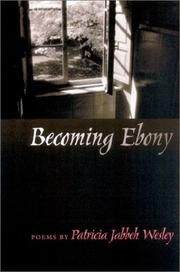(Crab Orchard Award Series in Poetry)
From Booklist
*Starred Review* Wesley focuses ardently on the little things--palm butter, lipstick, bony fish--to build a pathway to the overwhelming facets of life, the ruptures and terrors of war and exile, the ever-lastingness of death. Born and raised in Liberia, Wesley was forced into exile by that land's horrendous civil war, and ultimately found sanctuary in Kalamazoo, Michigan, where she teaches creative writing and African literature at Western Michigan University. Wesley writes with clear-eyed lyricism about her ruthless and beleaguered homeland, and the bittersweet relief and loss of the diaspora. Her poems are scintillating and vivid, quickly sketched fables shaped by recollections of childhood playmates, moonlight and ocean surf, hibiscus hedges, and big pots of boiling soup. But these paeans to home blend with percussive visions of falling rockets and murdered children, sharp recollections of hunger and mourning, and a survivor's careful gratitude in a land of cold winds and rationed sunlight, her carefully measured memories and cherished dreams of return. Donna Seaman
| LoC Classification |
PS3573.E915B43 2003 |
| Dewey |
811/.54 |
| Nationality |
Liberia |
| Pub Place |
Carbondale |
| Cover Price |
$14.95 |
| No. of Pages |
79 |
| Height x Width |
9.1
x
6.0
inch |
|
|
|
|
From Publishers Weekly
Wesley lived in Monrovia throughout Liberia's bloody six-year civil war, and many of her poems take as their themes war's atrocities: murder, rape, exile, loss, poverty. They confront the reader first of all with a toughness that is less confrontational than a kind of documentary reportage. But this second book also has something of the incantatory nature of Celan's poetics, in which the sheer repetition of certain phrases and ideas points out the irresolution in the mind of a survivor. Wesley works most often with aphorism and narrative: In one poem, "The child that wanders comes home only to graves" is transformed (in a later poem) to "The child that wanders will not know her mother's grave." Part of the strength of this collection is that it does not allow itself to wallow in the bleakness of this sentiment, but instead confronts and examines the power of death and suffering: "The mysteries of this world are not in the living./ The mysteries of this world are in the dead cold of/ death, in the weathered things of this world, in/ the silence that the dead refuse to take along when/ the dead leave." Wesley's speaker is powerful enough to proclaim that "all of us are now concubines of war" and, elsewhere, that "to be alive still is such a matter for dancing." In almost every section of the book, the reader is faced both with the brutal realities of life in parts of the world, and the lyric's possibilities for delineating a space that can act against them.
Copyright 2003 Reed Business Information, Inc.
